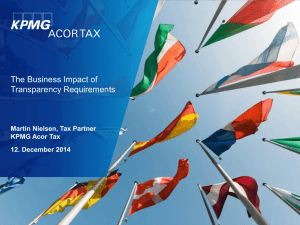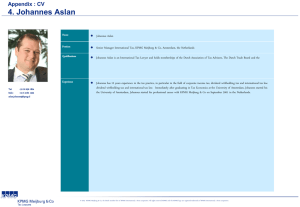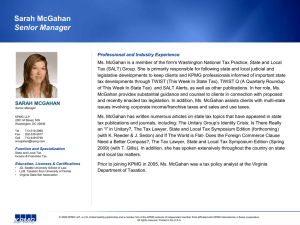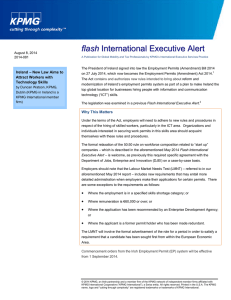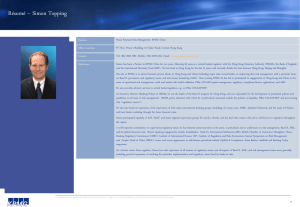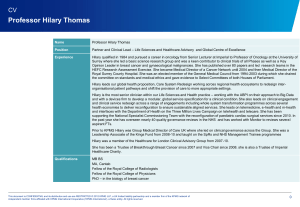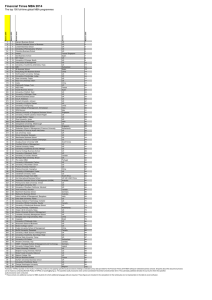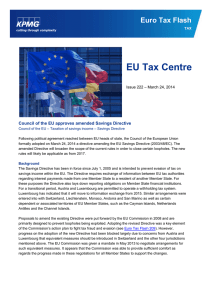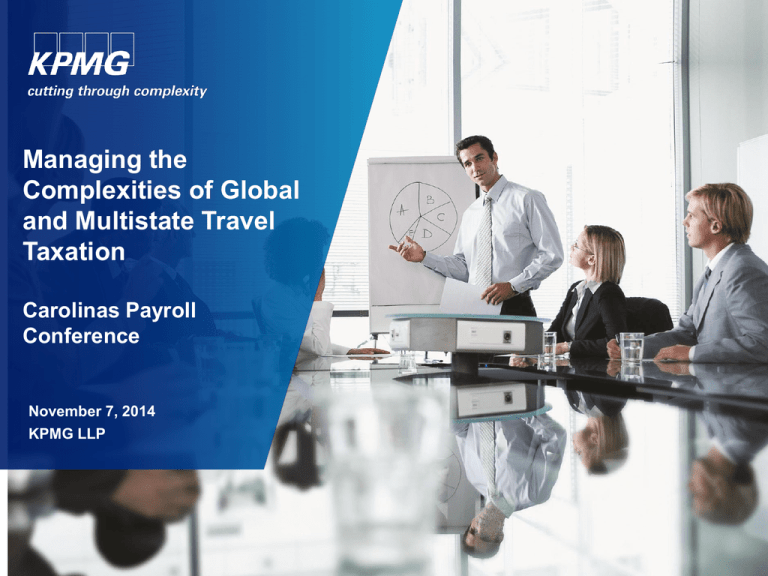
Managing the
Complexities of Global
and Multistate Travel
Taxation
Carolinas Payroll
Conference
November 7, 2014
KPMG LLP
ANY TAX ADVICE IN THIS COMMUNICATION IS NOT INTENDED OR WRITTEN
BY KPMG TO BE USED, AND CANNOT BE USED, BY A CLIENT OR ANY OTHER
PERSON OR ENTITY FOR THE PURPOSE OF (i) AVOIDING PENALTIES THAT
MAY BE IMPOSED ON ANY TAXPAYER OR
(ii) PROMOTING, MARKETING OR RECOMMENDING TO ANOTHER PARTY ANY
MATTERS ADDRESSED HEREIN.
Notwithstanding anything to the contrary set forth herein, you (and your employees,
representatives, or other agents) may disclose to any and all persons, without limitation
of any kind, the tax treatment and tax structure of any transaction, and all materials of any
kind (including opinions or other tax analyses) that are provided to you by KPMG LLP
related to such tax treatment and tax structure, effective immediately upon
commencement of discussions with KPMG LLP.
The information contained herein is of a general nature and based on authorities that are
subject to change. Applicability of the information to specific situations should be
determined through consultation with your tax adviser.
© 2011 KPMG LLP, a Delaware limited liability partnership and the U.S. member firm of the KPMG network of independent member firms affiliated
with KPMG International Cooperative (“KPMG International”), a Swiss entity. All rights reserved. 33372WDC
1
Agenda
Provide an overview of the issues associated with mobile employees including:
–
Current State of Business Travel
–
Risk Factors & Exposure
–
Multi-jurisdictional Withholding Issues
Domestic
Global
–
Special Issues Surrounding Equity & Other Incentive Compensation
–
Employment Tax Reporting & Withholding Survey
–
What Can Be Done?
–
Hope for the Future?
© 2011 KPMG LLP, a Delaware limited liability partnership and the U.S. member firm of the KPMG network of independent member firms affiliated
with KPMG International Cooperative (“KPMG International”), a Swiss entity. All rights reserved. 33372WDC
2
Current State of Business Travel
Business travel remains strong
For calendar 2013 a global corporation identified 140,000 individual business trips.
Many organizations have developed “swat teams” of frequent business travelers who are on
the road more often than at home
Costs associated with “business travel” often less than traditional international assignment
Business travel is, for the most part, unregulated
Most organizations do not track foreign or domestic business travel for any purpose other
than expense reimbursement
Most organizations do not utilize a time capture system which contains a “location” field
In a recent poll of KPMG’s IES clients, 100% of the responding organizations rated the
controls in place around their business travelers as “lacking” or “severely lacking”
© 2011 KPMG LLP, a Delaware limited liability partnership and the U.S. member firm of the KPMG network of independent member firms affiliated
with KPMG International Cooperative (“KPMG International”), a Swiss entity. All rights reserved. 33372WDC
3
What is Your “Traveler” Profile?
Organizations “at risk”
Companies that have a population of employees who travel frequently
Organizations which have operations in CA, CT or NY, with employees from other states
traveling there
Companies with global operations in non-treaty countries
Public companies with equity/incentive compensation plans in place
Organizations with extremely high paid employees in “deal making” roles, e.g. PE firms, M&A
teams, etc.
© 2011 KPMG LLP, a Delaware limited liability partnership and the U.S. member firm of the KPMG network of independent member firms affiliated
with KPMG International Cooperative (“KPMG International”), a Swiss entity. All rights reserved. 33372WDC
4
Business Travel Defined
Generally less than 12 months “away from home”
Assignments < 183 days
May qualify for tax treaty exemption
Assignments > 183 days, but < 12 months
The taxpayer shall not be treated as being temporarily away from home during any
period of employment if such period exceeds 1 year (§162(a))
“Realistic expectation” of assignment length (R.R. 93-86)
Indefinite assignments
Change in assignment length
Traveling expenses (meals, lodging, transportation, etc.) deductible / excludable when
“temporarily” away from home on business
Per diems treated as “substantiated” for U.S. income tax purposes under “accountable
plan” rules
Government table sets limits
Assignments > 12 months
Reimbursements for meals, lodging, transportation, etc. are taxable income
© 2011 KPMG LLP, a Delaware limited liability partnership and the U.S. member firm of the KPMG network of independent member firms affiliated
with KPMG International Cooperative (“KPMG International”), a Swiss entity. All rights reserved. 33372WDC
5
Identifying Potential Exposures
Frequent business travel can create multiple types of exposure
Corporate Level
Corporate Tax
– Nexus (domestic)
– Permanent Establishment (global)
Payroll / Compliance
– Failure to report income and/or withhold income tax
– Failure to withhold/pay social insurance
Reputational – issue specific, media exposure
Individual level
Compliance - Failure to file / pay individual income tax
Immigration - Failure to obtain proper work permits/visas
Criminal - Employee detainment
© 2011 KPMG LLP, a Delaware limited liability partnership and the U.S. member firm of the KPMG network of independent member firms affiliated
with KPMG International Cooperative (“KPMG International”), a Swiss entity. All rights reserved. 33372WDC
6
Why is This Important?
The identification and assessment of tax on business travelers (domestically and internationally)
continues to be a focus
Government regulation will continue to increase
Federal
IRS to conduct employment tax audits of 6,000 businesses
IRS audits to focus on:
Fringe Benefits
Officer Compensation
Worker Classification (“contractor” vs. “employee”)
State - Payroll Audit Emphasis
Global
Emphasis on ST business travelers
Equity / Deferred Compensation
There has been significant movement by organizations to implement procedures to assess
their exposure
© 2011 KPMG LLP, a Delaware limited liability partnership and the U.S. member firm of the KPMG network of independent member firms affiliated
with KPMG International Cooperative (“KPMG International”), a Swiss entity. All rights reserved. 33372WDC
7
Multi-jurisdictional withholding – A perfect storm
Increasingly mobile workforces
Increased scrutiny by tax authorities
Corporate, payroll tax compliance
Localities joining in
Broader use of equity awards
Complexity around awards
Difficulty in controlling the process
Focus by media
Corporate monetary and brand risk
Long Term Awards
Regulatory
Activity/Tax
Compliance
Mobile
Employees
© 2011 KPMG LLP, a Delaware limited liability partnership and the U.S. member firm of the KPMG network of independent member firms affiliated
with KPMG International Cooperative (“KPMG International”), a Swiss entity. All rights reserved. 33372WDC
8
Multi-Jurisdictional Income Tax Withholding - What you Need to Know
Some jurisdictions have de
minimis thresholds that
must be identified and
monitored.
Ignorance is no defense.
Increased audit
enforcement by states.
Company officers could be
liable for under withheld
amounts.
What Employers
Need to Know
?
Payroll systems could be
ineffective.
© 2011 KPMG LLP, a Delaware limited liability partnership and the U.S. member firm of the KPMG network of independent member firms affiliated
with KPMG International Cooperative (“KPMG International”), a Swiss entity. All rights reserved. 33372WDC
9
Multi-Jurisdictional Withholding – What Are the Problems?
Employers cannot track employee movement on a daily basis
Employers cannot collect and maintain required documentation for proper wage
allocation
Payroll systems cannot allocate wages correctly to match time spent in multiple
jurisdictions
Inconsistent policies and procedures for monitoring a mobile workforce
© 2011 KPMG LLP, a Delaware limited liability partnership and the U.S. member firm of the KPMG network of independent member firms affiliated
with KPMG International Cooperative (“KPMG International”), a Swiss entity. All rights reserved. 33372WDC
10
Varying Approaches to Managing Business Travelers
Non-compliance
Not complying with
nonresident
withholding rules
regardless of where
compensation was
sourced as earned.
Partial Compliance
Establish a system for
all or select employees
who perform services
in specific jurisdictions
to track source
income.
Full Compliance
Developing/utilizing a
system to ensure
proper withholding and
source recognition of
earnings in
nonresident
jurisdictions.
Any approach that does not involve withholding and remitting taxes on all wages
earned, could have an associated tax exposure, including penalty and interest
assessment.
© 2011 KPMG LLP, a Delaware limited liability partnership and the U.S. member firm of the KPMG network of independent member firms affiliated
with KPMG International Cooperative (“KPMG International”), a Swiss entity. All rights reserved. 33372WDC
11
Multistate withholding risks and control obstacles
Barriers to compliance
–
Time and expense system limitations
–
Third-party vendors unable to comply
–
Corporate culture
–
Employee impact
–
Employers cannot track employee movement on a daily basis
–
Inconsistent policies and procedures for monitoring a mobile workforce
Potential risk associated with noncompliance
Aggressive enforcement for almost a decade
–
Audit risk
–
Public relations
–
Tax principal/penalty/interest assessments
© 2011 KPMG LLP, a Delaware limited liability partnership and the U.S. member firm of the KPMG network of independent member firms affiliated
with KPMG International Cooperative (“KPMG International”), a Swiss entity. All rights reserved. 33372WDC
12
Nonresident state income tax withholding
In general, employers are required to withhold SIT on nonresidents of a state if services are
or were performed by the employee in that state
Section 114 (former Public Law 104-95) exception – “retirement/pension income”
–
Applicable to qualified pension income only
–
Generally not applicable for equity compensation, bonus, deferred comp, etc.
Exceptions/limitations:
–
De minimis rules of certain states (not always applicable to equity compensation)
–
Reciprocal agreements between states
–
Telecommuting (convenience of the employer doctrine)
–
Exemption certificate allocation and pre-allocation of time spent
© 2011 KPMG LLP, a Delaware limited liability partnership and the U.S. member firm of the KPMG network of independent member firms affiliated
with KPMG International Cooperative (“KPMG International”), a Swiss entity. All rights reserved. 33372WDC
13
Nonresident withholding de minimis jurisdictions
As of September 1, 2014
WA
MT
ND
ME
OR
ID
WI
SD
WY
NV
NY
MI
IA
NE
CO
AZ
KS
OK
NM
WV
MO
NC
TN
AR
DE
MD
VA
KY
DC
SC
MS
TX
NJ
OH
IN
MA
RI
CT
PA
IL
UT
CA
VTNH
MN
AL
GA
LA
FL
AK
States with de minimis rules or exceptions
HI
Source: KPMG LLP International Executive Services.
States without de minimis rules or exceptions
States with no withholding provision
© 2011 KPMG LLP, a Delaware limited liability partnership and the U.S. member firm of the KPMG network of independent member firms affiliated
with KPMG International Cooperative (“KPMG International”), a Swiss entity. All rights reserved. 33372WDC
14
The Concept of the “Stealth Assignee”
Frequent business travel to a specific host location can create an unexpected tax or “document”
exposure
Highly compensated employees can create this exposure with a minimal amount of travel
Median family income State of NY – $55,980 (source: US Census Bureau)
Executive with $1 million in annual compensation reaches this level in 14 work days
In many circumstances exposure is created almost immediately
State of North Carolina – tax withholding/filing obligation created with first dollar of NC-source
income
Korea – $3,000 limit for treaty exemption
© 2011 KPMG LLP, a Delaware limited liability partnership and the U.S. member firm of the KPMG network of independent member firms affiliated
with KPMG International Cooperative (“KPMG International”), a Swiss entity. All rights reserved. 33372WDC
15
Consider This…
New York State Nonresident Withholding Example
NYS nonresident SIT rules (general)
–
Regular wages allocated to NY according to ratio of NY workdays to total workdays (14day de minimus)
–
Equity compensation – no annual de minimus; multi-year allocation
State Income Tax Exposure / Risks (employer)
–
Tax:
–
100% of the unpaid tax that should have been withheld on the employee’s NY
compensation
Penalties & Interest:
Late Payment: .5% / month of tax not paid up to 25% of total original tax
Failure to File: 5% of unpaid tax + 50% of the calculated interest
Interest – rate varies by quarter
© 2011 KPMG LLP, a Delaware limited liability partnership and the U.S. member firm of the KPMG network of independent member firms affiliated
with KPMG International Cooperative (“KPMG International”), a Swiss entity. All rights reserved. 33372WDC
16
Consider This…
New York State Nonresident Withholding Example
Facts: A salaried employee with an annual salary of $100k works 25% of his time in NY. Also
has $100k of non-qualified stock option gain. Employer sources $0 to NYS
Potential State Income Tax Exposure for the Year:
–
NY Tax on wages
$857 (single – 0 allowances)
–
NY tax on stock NQSO
$2,758 (supplemental rate)
–
Estimated Late Pay Penalty
$1,030
–
Estimated Negligence Penalty
$325
–
Estimated Interest
$290
$5,260
Total Potential Exposure
© 2011 KPMG LLP, a Delaware limited liability partnership and the U.S. member firm of the KPMG network of independent member firms affiliated
with KPMG International Cooperative (“KPMG International”), a Swiss entity. All rights reserved. 33372WDC
17
Consider This…
New York State Nonresident Withholding Example
–
–
$5,260 State Tax Assessment per Individual / Year
5 Individuals
$26,300 @ 3 years = $78,900
10 Individuals
$52,600 @ 3 years = $157,800
50 Individuals
$263,000 @ 3 years = $789,000
100 Individuals
$526,000 @ 3 years = $1,578,000
Includes NY Tax, penalty & interest
© 2011 KPMG LLP, a Delaware limited liability partnership and the U.S. member firm of the KPMG network of independent member firms affiliated
with KPMG International Cooperative (“KPMG International”), a Swiss entity. All rights reserved. 33372WDC
18
State withholding audit activity (samples)
New York
–
Aggressive enforcement for almost a decade
–
Large assessments especially on allocation of equity compensation
California
–
Aggressive since the mid-90s
–
New initiative for auditor hiring/training
–
San Francisco Payroll Expense Tax (being phased out)
Minnesota – Cancellation of WI reciprocity, taxation of nonresident equity compensation
Connecticut
–
Enacted New York’s de minimis regulations as their own
–
Uptick in Connecticut audits
Increase in audit activity in states that border a state with no personal income taxes
–
Massachusetts, Georgia, etc.
© 2011 KPMG LLP, a Delaware limited liability partnership and the U.S. member firm of the KPMG network of independent member firms affiliated
with KPMG International Cooperative (“KPMG International”), a Swiss entity. All rights reserved. 33372WDC
19
An International Twist…
Example – Financial Services Client
Total compensation expense of $31,528 M
Employing approx 284,000 people
Average salary of highly compensated employees - $222,000
Global operations: UK, Brazil, Korea, NY, CA
Assumptions
Approx 5% of employees travel frequently domestically (45 days +)
Approx 2.5% of employees travel to UK (30 days +)
Approx .5% employees travel to Brazil (24 days +)
© 2011 KPMG LLP, a Delaware limited liability partnership and the U.S. member firm of the KPMG network of independent member firms affiliated
with KPMG International Cooperative (“KPMG International”), a Swiss entity. All rights reserved. 33372WDC
20
It can add up
Potential domestic non-resident withholding exposure
$222,000 x 14,200 (5% of employees) x 20% (45/240 days worked in NR state) x 8% (avg.
tax rate of NY/CA) = $50M
Potential UK tax exposure
$222,000 x 7,100 (2.5% of employees) x 12.5% (30/240 days worked in UK) x 40% (tax rate
in UK) = $79M
Potential Brazilian tax exposure
$222,000 x 1,420 (.5% of employees) x 10% (24/240 days worked in Brazil) x 27.5% = $9M
TOTAL = $138M for one year
© 2011 KPMG LLP, a Delaware limited liability partnership and the U.S. member firm of the KPMG network of independent member firms affiliated
with KPMG International Cooperative (“KPMG International”), a Swiss entity. All rights reserved. 33372WDC
21
Income Tax Treaties Can Help
Effect of income tax treaties
Residency article (Tie Breaker)
Dependent personal services article
Double taxation article
Does not cover Social Security taxes
Does not directly cover state taxes
© 2011 KPMG LLP, a Delaware limited liability partnership and the U.S. member firm of the KPMG network of independent member firms affiliated
with KPMG International Cooperative (“KPMG International”), a Swiss entity. All rights reserved. 33372WDC
22
Income Tax Treaties - Residence
Article 4 of Most Treaties
(1) The term “resident of a Contracting State” means any person who, under the laws of that
State, is liable to tax therein by reason of his domicile, residence, place of management,
place of incorporation, or any other criterion of a similar nature.
(2) Where by reason of the provision of paragraph 1, an individual is a resident of both
Contracting States, then his residence shall be determined as follows:
(a)
He shall be deemed to be a resident of the State in which he has a permanent home available to him; if he has a
permanent home available to him in both States, he shall be deemed to be a resident of the State with which his
personal and economic relations are closer (center of vital interests);
(b)
If the State in which he has his center of vital interest cannot be determined, or if he does not have a permanent home
available to him in either State, he shall be deemed to be a resident of the State in which he has an habitual abode;
(c)
If he has an habitual abode in both State or in neither of them, he shall be deemed to be a resident of the State of which
he is a national
(d)
In any other case, decided by competent authorities of the Contracting States
Saving Clause
A Contracting State may tax its residents (as determined under Article 4(Residence)) and
by reason of citizenship may tax its citizens, as if the Convention had not come into effect.
© 2011 KPMG LLP, a Delaware limited liability partnership and the U.S. member firm of the KPMG network of independent member firms affiliated
with KPMG International Cooperative (“KPMG International”), a Swiss entity. All rights reserved. 33372WDC
23
Income Tax Treaties - Dependent Personal Services Article
United States/Mexico treaty example:
(1) Salaries, wages and other similar remuneration derived by a resident of a contracting state in
respect of an employment shall be taxable only in that State unless the employment is
exercised in the other Contracting State. If the employment is so exercised, such
remuneration as is derived therefrom may be taxed in that other State.
(2) Notwithstanding the provisions of paragraph 1, remuneration derived by a resident of a
contracting State in respect of an employment exercised in the other Contracting State shall
be taxable only in the first-mentioned State if:
(a) The recipient is present in that other State for a period not exceeding in the aggregate
183 days in a 12-month period; and
(b) The remuneration is paid by, or on behalf of, an employer who is not a resident of that
other state; and
(c) The remuneration is not borne as such by a permanent establishment or a fixed base
which the employer has in that other state.
© 2011 KPMG LLP, a Delaware limited liability partnership and the U.S. member firm of the KPMG network of independent member firms affiliated
with KPMG International Cooperative (“KPMG International”), a Swiss entity. All rights reserved. 33372WDC
24
Income Tax Treaties – Common Mishaps / Misperceptions
Chargebacks / Cross-charges
Use of Technical Services / Management Services Agreements
Transfer pricing concerns
Potential corporate PE issues
Extensions or ad hoc travel following assignment
May not cover all individual taxes (e.g. U.S. states may not recognize treaties)
Limited treaty network or DPS clause
May not eliminate withholding requirement
Canada requires withholding waiver in advance of business travel, regardless of treaty
exemption
Does not cover social taxes
Totalization agreement network much more limited
© 2011 KPMG LLP, a Delaware limited liability partnership and the U.S. member firm of the KPMG network of independent member firms affiliated
with KPMG International Cooperative (“KPMG International”), a Swiss entity. All rights reserved. 33372WDC
25
25
Current DPS Treaty Countries
Australia
Finland
Italy
Netherlands
Slovenia
U.K.
Austria
France
Jamaica
New Zealand
South Africa
Venezuela
Belgium
Germany
Japan
Norway
Spain
Canada
Greece
Kazakstan
Pakistan
Sweden
China
Hungary
Korea
Philippines
Switzerland
Cyprus
Iceland
Latvia
Poland
Thailand
Czech Rep.
India
Lithuania
Portugal
Trinidad &
Tobago
Denmark
Indonesia
Luxembourg
Romania
Tunisia
Egypt
Ireland
Mexico
Russia
Turkey
Estonia
Israel
Morocco
Slovak
Republic
Ukraine
© 2011 KPMG LLP, a Delaware limited liability partnership and the U.S. member firm of the KPMG network of independent member firms affiliated
with KPMG International Cooperative (“KPMG International”), a Swiss entity. All rights reserved. 33372WDC
26
26
KPMG survey information by country
Current or increase
in audit activity
Europe
Belgium
Cyprus
Germany
Greece
Kazakhstan
Ireland
Norway
Portugal
Spain
Sweden
Switzerland
United
Kingdom
Africa
Botswana
Morocco
South Africa
Americas
Canada
Costa Rica
Honduras
Mexico
United States
Asia
China
Hong Kong
India
Japan
Korea
Malaysia
Singapore
Australia
Source: KPMG Member Firms
© 2011 KPMG LLP, a Delaware limited liability partnership and the U.S. member firm of the KPMG network of independent member firms affiliated
with KPMG International Cooperative (“KPMG International”), a Swiss entity. All rights reserved. 33372WDC
27
Assessing Global Risk
Review of 25 global locations to understand Tax, P & I exposure
Specifically regarding employer compliance for equity compensation: reporting/withholding
Takeaways:
Frequently, country taxing authorities will levy penalties and interest
against the employer for failure to operate payroll withholding and/or
reporting, even if the income is reported on the annual tax return
Penalty and interest amounts vary widely across countries:
–
China: Up to 500% of underpaid tax
–
Hong Kong: Up to 300% of tax due to under reporting + fine
–
Poland: Fines of up to PLN 18,000,000 (approx. $5.3M)
–
Singapore: Up to 200% of tax due to under reporting
–
Thailand: Up to 100% of underpaid tax + fine
–
Venezuela: Up to 500% of underpaid tax
Tax authorities may agree to mitigate penalty/interest charges if
employer voluntarily discloses compliance failure
© 2011 KPMG LLP, a Delaware limited liability partnership and the U.S. member firm of the KPMG network of independent member firms affiliated
with KPMG International Cooperative (“KPMG International”), a Swiss entity. All rights reserved. 33372WDC
28
The Equity Compensation
Equation
Equity awards and related compensation
Basis for equity based compensation typically spans multiple years
Employers required to allocate gain based upon time an employee performs services in a
particular jurisdiction.
Highly compensated individuals, such as C suite executives, travel to numerous states while
executing their responsibilities.
States are aware of such employee movements and are becoming more aggressive in their
enforcement efforts with respect to employer withholding.
Public corporations, private equity firms, financial institutions and non-U.S. based companies
with U.S. presence are key audit targets
Bonus allocation challenges, i.e., withholding current year taxes based on prior year services
related to bonus payment
© 2011 KPMG LLP, a Delaware limited liability partnership and the U.S. member firm of the KPMG network of independent member firms affiliated
with KPMG International Cooperative (“KPMG International”), a Swiss entity. All rights reserved. 33372WDC
30
The Equity Compensation Equation
Equity compensation does not always follow general de minimis rules
Can require record keeping to reflect awards from grant date through exercise
Treatment varies greatly from country to country, state to state
Example – While NYS has a 14 day de minimis for SIT withholding, equity compensation is
taxable immediately upon income recognition based on all days spent in state
© 2011 KPMG LLP, a Delaware limited liability partnership and the U.S. member firm of the KPMG network of independent member firms affiliated
with KPMG International Cooperative (“KPMG International”), a Swiss entity. All rights reserved. 33372WDC
31
Employment Tax
Withholding and Reporting
Survey
Survey objectives, methodology,
and key findings
Employment tax withholding and reporting survey
Survey Objectives
The survey was performed to gauge employer position and perception regarding
nonresident/multistate withholding
Designed to have the results shared in “white paper” format in order to provide a broad based
view into organizational treatment
Survey Methodology
Electronic survey sent to KPMG clients in March, 2013
103 organizations responded and provided input
Respondents included large and middle market employers in many industries
All responses anonymous
© 2011 KPMG LLP, a Delaware limited liability partnership and the U.S. member firm of the KPMG network of independent member firms affiliated
with KPMG International Cooperative (“KPMG International”), a Swiss entity. All rights reserved. 33372WDC
33
Industry
Banking & Finance
13%
Information Technology &
Software
11%
Healthcare
8%
Other
Automotive Manufacturers &
Suppliers
1%
Communications
1%
Energy and Natural Resources
1%
Business Process
Outsourcing
Charitable Foundation
Cleaning Service
CPA firm
Building & Construction
5%
Internet & Social Media
Education
1%
Engineering
Oil & Gas
4%
Investment Management
1%
Retail
4%
Media
1%
Manufacturing
Aerospace & Defense
3%
Pharmaceuticals
1%
Chemicals
3%
Real Estate
1%
1%
Conglomerates, Engineering &
Industrial Products, Metals
2%
Transportation
Food, Drink & Consumer Goods
2%
Electronics
0%
Insurance
2%
Power & Utilities
0%
Mining
2%
Other
0%
10%
Management Consulting
20%
30%
40%
50%
Non profit Zionist
organization
Professional Services
Scientific and educational
31%
0%
10%
20%
30%
40%
50%
Does not add up to 100% due to rounding
© 2011 KPMG LLP, a Delaware limited liability partnership and the U.S. member firm of the KPMG network of independent member firms affiliated
with KPMG International Cooperative (“KPMG International”), a Swiss entity. All rights reserved. 33372WDC
34
Respondents – Number of employees
100%
80%
60%
40%
40%
20%
11%
13%
5,000 to less
than 10,000
10,000 to less
than 25,000
17%
19%
25,000 to less
than 50,000
50,000 or more
0%
Less than 5,000
© 2011 KPMG LLP, a Delaware limited liability partnership and the U.S. member firm of the KPMG network of independent member firms affiliated
with KPMG International Cooperative (“KPMG International”), a Swiss entity. All rights reserved. 33372WDC
35
Majority say U.S. nonresident state withholding/reporting is a growing issue
with salary as the top concern with respect to compliance and/or risk
Salary
52%
15%
32%
Equity awards
53%
Yes, it is a major issue
Yes, it is a growing issue
No
Q. Is U.S. nonresident state withholding/reporting a major or growing issue
for your organization with respect to compliance and/or risk?
24%
Cash balance
3%
All of the above
41%
0%
20%
40%
60%
Q. What type of compensation is this concern centered around?
© 2011 KPMG LLP, a Delaware limited liability partnership and the U.S. member firm of the KPMG network of independent member firms affiliated
with KPMG International Cooperative (“KPMG International”), a Swiss entity. All rights reserved. 33372WDC
36
Half say they do not have procedures and/or technology in place to
monitor employee work travel and remit/report taxes accordingly
100%
80%
60%
51%: Procedures and/or technology in place
49%
40%
27%
22%
20%
2%
0%
Yes, we have
procedures
in place
Yes, we have
technology
in place
Yes, we have both
procedures
and technology in
place
No
Q. Do you currently have procedures and/or technology in place to monitor employee work travel and remit/report taxes accordingly?
© 2011 KPMG LLP, a Delaware limited liability partnership and the U.S. member firm of the KPMG network of independent member firms affiliated
with KPMG International Cooperative (“KPMG International”), a Swiss entity. All rights reserved. 33372WDC
37
Most say corporate compliance is the main driver for having
procedures in place
Among those who have procedures in place to monitor employee work travel and
remit/report taxes
7%
4%
89%
Corporate compliance
Reputational risk (brand damage)
Monetary risks
Q. What is the main driver for having procedures in place?
© 2011 KPMG LLP, a Delaware limited liability partnership and the U.S. member firm of the KPMG network of independent member firms affiliated
with KPMG International Cooperative (“KPMG International”), a Swiss entity. All rights reserved. 33372WDC
38
Half anticipate implementing procedures and/or technology to monitor
employee work travel and remit/report taxes
Among those who do not have procedures and/or technology in place to monitor
employee work travel and remit/report taxes
100%
80%
48%: Anticipate implementing
60%
51%
40%
20%
10%
8%
18%
12%
0%
Less than 6
months
6 to less than 12 12 to less than
months
24 months
24 months or
more
Do not anticipate
implementing a
program
Does not add up to 100% due to rounding
Q. Do you anticipate implementing such a program in the next:…
© 2011 KPMG LLP, a Delaware limited liability partnership and the U.S. member firm of the KPMG network of independent member firms affiliated
with KPMG International Cooperative (“KPMG International”), a Swiss entity. All rights reserved. 33372WDC
39
Nearly half are dissatisfied with the ability of their current
processes/systems to effectively source salary and equity awards
100%
80%
47%: Poor/Looking for other alternatives
60%
43%
40%
34%
20%
13%
10%
0%
Excellent
Good
Poor
We are looking for
other alternatives
Q. How would you rate your current processes/systems to effectively source salary and equity awards to multiple states?
© 2011 KPMG LLP, a Delaware limited liability partnership and the U.S. member firm of the KPMG network of independent member firms affiliated
with KPMG International Cooperative (“KPMG International”), a Swiss entity. All rights reserved. 33372WDC
40
Only one quarter say their organization currently provides additional
tax support to employees working in multiple states
Yes, gross-up additional tax costs
15%
Yes, provide tax return preparation support
for other than primary work states
2%
Yes, gross-up additional tax costs and
provide tax return preparation support for
other than primary work states
25%: Yes
8%
No, we would not provide additional support
to these employees
75%
0%
20%
40%
60%
80%
100%
Q. Does your organization currently or expect to provide tax support to employees working in multiple states?
© 2011 KPMG LLP, a Delaware limited liability partnership and the U.S. member firm of the KPMG network of independent member firms affiliated
with KPMG International Cooperative (“KPMG International”), a Swiss entity. All rights reserved. 33372WDC
41
Multi-jurisdictional
Withholding
What can be done?
Multi-jurisdictional withholding – What can be done
Evaluation/assessment
–
Identify jurisdictions and employees likely to have material activity
–
Identify records/sources that provide indicators of activity
–
Determine pay types, e.g., base comp, equity, bonus, etc.
Compliance policy design
–
Determine processes
–
Methodology of data capture (travel records, employee data entry, etc.)
–
Real-time compliance
–
Communication and training to/for employees
–
Internal audit procedures
Practical issues/concerns
–
Phased roll-outs
–
IT/Technology/Security issues
–
Deployment Timeframes
Voluntary Disclosure Programs
© 2011 KPMG LLP, a Delaware limited liability partnership and the U.S. member firm of the KPMG network of independent member firms affiliated
with KPMG International Cooperative (“KPMG International”), a Swiss entity. All rights reserved. 33372WDC
43
Narrowing the field - How to filter?
All Employees
Business Travelers
Business
Travelers with
Potential
Exposure
© 2011 KPMG LLP, a Delaware limited liability partnership and the U.S. member firm of the KPMG network of independent member firms affiliated
with KPMG International Cooperative (“KPMG International”), a Swiss entity. All rights reserved. 33372WDC
44
The road to compliance
Collection
Assessment
Action
Communication
© 2011 KPMG LLP, a Delaware limited liability partnership and the U.S. member firm of the KPMG network of independent member firms affiliated
with KPMG International Cooperative (“KPMG International”), a Swiss entity. All rights reserved. 33372WDC
Governance
Compliance
45
Collection
Collection
Assessment
Action
Communication
Governance
Employee/delegate input, IP address, smart phone, location services
Single versus multiple platforms
User acknowledgement/reminders
Timing of submission and locking data
Data storage warehouse
Security (IT Risks)
© 2011 KPMG LLP, a Delaware limited liability partnership and the U.S. member firm of the KPMG network of independent member firms affiliated
with KPMG International Cooperative (“KPMG International”), a Swiss entity. All rights reserved. 33372WDC
Compliance
46
Assessment
Collection
Assessment
Action
Communication
Governance
Compliance
U.S. Considerations
State de minimis rules
Reciprocity Agreements
State specific exemptions
Global Considerations
Double tax agreements, social security, immigration
Risk profile
© 2011 KPMG LLP, a Delaware limited liability partnership and the U.S. member firm of the KPMG network of independent member firms affiliated
with KPMG International Cooperative (“KPMG International”), a Swiss entity. All rights reserved. 33372WDC
47
Action
Collection
Assessment
Action
Communication
Allocation between multiple jurisdictions
Payroll calculations
Delivery of pay
Store allocations and track for long term incentives
Integration/Connectivity with multiple systems and stakeholders
Employee compliance (tax returns, visa, work permits etc.)
© 2011 KPMG LLP, a Delaware limited liability partnership and the U.S. member firm of the KPMG network of independent member firms affiliated
with KPMG International Cooperative (“KPMG International”), a Swiss entity. All rights reserved. 33372WDC
Governance
Compliance
48
Communication
Collection
Assessment
Action
Communication
Governance
Employee communications (including reminders)
Policy awareness (funding of taxes, multi jurisdiction filing requirements, payroll
calculations versus final liabilities)
Ongoing and new hire training
Identify and publish contacts
© 2011 KPMG LLP, a Delaware limited liability partnership and the U.S. member firm of the KPMG network of independent member firms affiliated
with KPMG International Cooperative (“KPMG International”), a Swiss entity. All rights reserved. 33372WDC
Compliance
49
Governance
Collection
Assessment
Action
Policy owners
Travel policies
Internal audits (e.g., expense reports)
Non compliance sanctions/penalties
Quarterly reviews
External audit support
Communication
© 2011 KPMG LLP, a Delaware limited liability partnership and the U.S. member firm of the KPMG network of independent member firms affiliated
with KPMG International Cooperative (“KPMG International”), a Swiss entity. All rights reserved. 33372WDC
Governance
Compliance
50
Hope for the Future?
Hope for the Future?
Mobile Workforce State Income Tax Simplification Act of 2013
Primary Goal – Harmonize the state tax treatment of multi-state business travelers
Primary Provisions:
Individual will not be subject to tax in a nonresident state if present for no more than 30-days
Employer not subject to wage reporting / tax withholding
Employer may rely on employee’s estimate of time spent in nonresident state unless
Employer has actual knowledge of employee fraud, or
Employer maintains a time / attendance system that tracks where employee performs services
Applicable to “wages & other remuneration”
A “day” consists of a part of a day if only one nonresident state involved
If multiple states, then the state in which most time is spent
Does not include time spent in a state while in transit
Does not apply to professional athletes / entertainers
© 2011 KPMG LLP, a Delaware limited liability partnership and the U.S. member firm of the KPMG network of independent member firms affiliated
with KPMG International Cooperative (“KPMG International”), a Swiss entity. All rights reserved. 33372WDC
52
Hope for the Future?
Mobile Workforce State Income Tax Simplification Act of 2013
Introduced into the Senate on 11/05/13
16 Bi-partisan cosponsors
Latest Action – Read twice and referred to the Committee on Finance
Prognosis: 22% chance of being enacted
© 2011 KPMG LLP, a Delaware limited liability partnership and the U.S. member firm of the KPMG network of independent member firms affiliated
with KPMG International Cooperative (“KPMG International”), a Swiss entity. All rights reserved. 33372WDC
53
Contact details
Vincent E. Rieck, CPA
Tax Managing Director
Global Mobility Services
Phone 704-335-5392
Charlotte, NC

